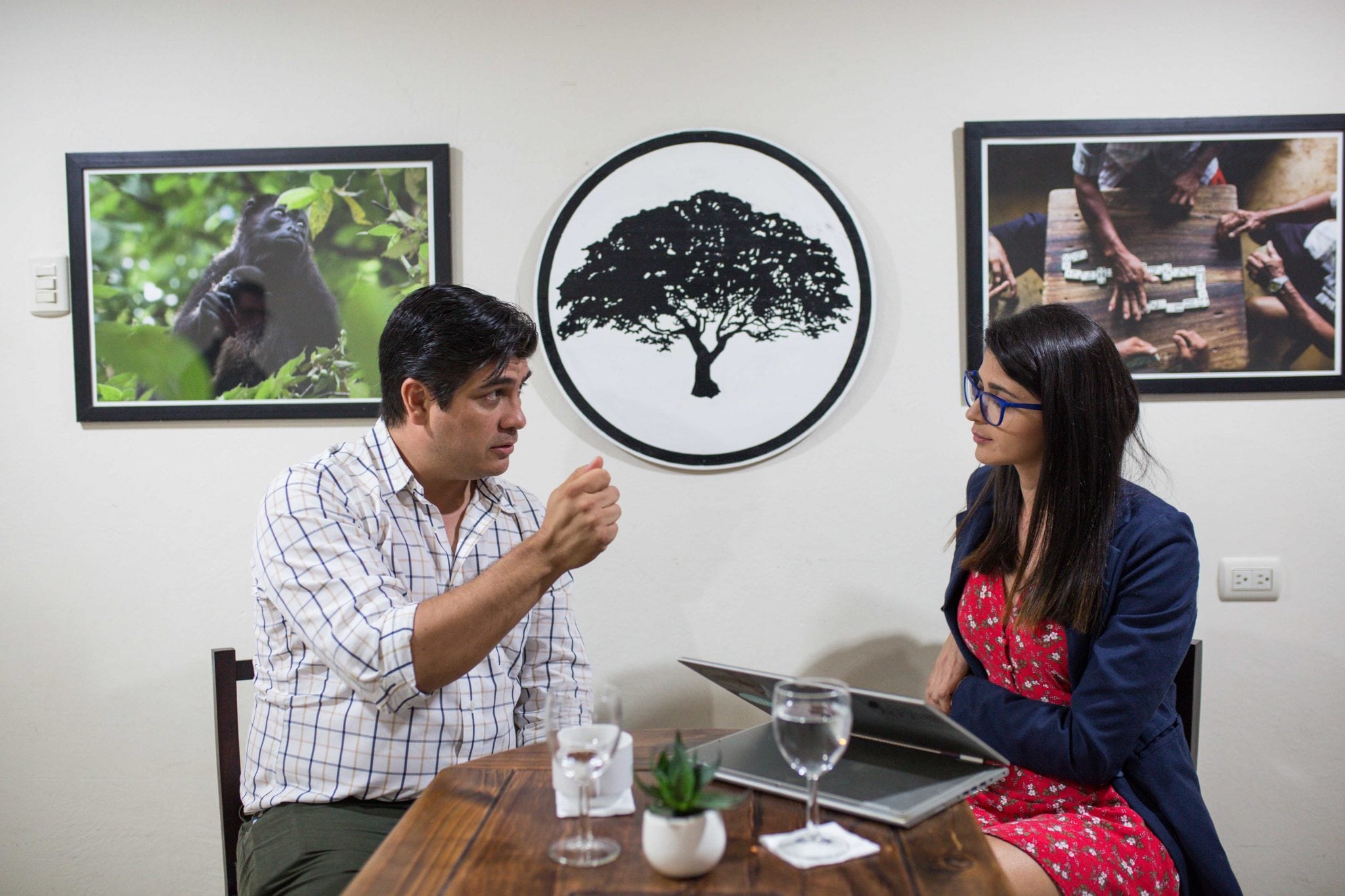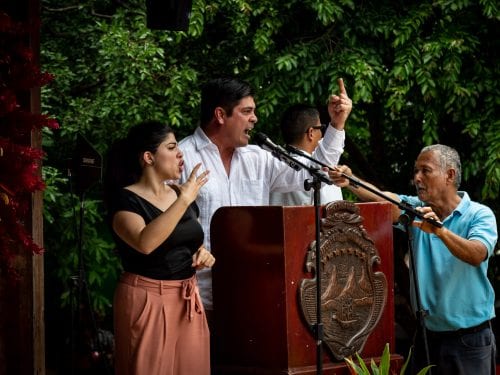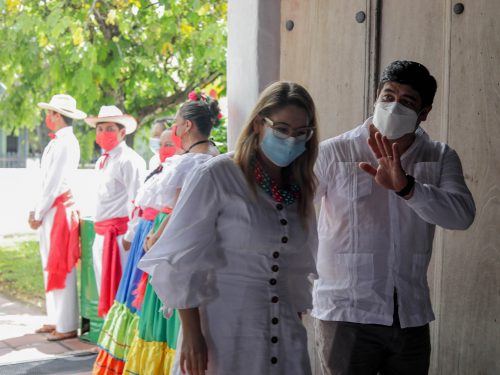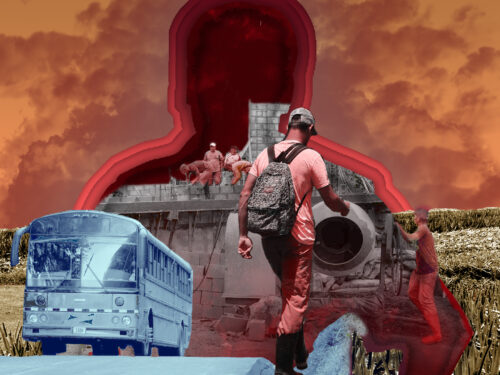
During the annexation of Nicoya festivities, President Carlos Alvarado Quesada promised to visit the 11 cantons of Guanacaste, he placed the first brick of the new Coca-Cola plant in Liberia, he went to the expansion of the Daniel Oduber airport, cut ribbons for aqueduct and roadway projects…and spoke with The Voice of Guanacaste.
In the interview, we asked him about the least explored topics during his trip, such as domestic violence, therapeutic abortion, regulating water from Paacume so it is used efficiently, and his commitment to chronic kidney disease patients.
This is an extract of the conversation, which was originally broadcast on Facebook Live.
It has been slightly edited for space and clarity reasons.
How are you going to make sure the Paacume water is consumed correctly? One of the biggest worries is whether we are going to open the floodgates and flood crops or if we are going to promote a more conscious use. We haven’t found that out about Paacume yet.
It’s an issue that the Agriculture Ministry, Senara and citizens have to move forward with. I remember several years ago when the debate was whether or not to do the project. Now that we know that we are going to do the project, we want to know how involved small farmers are going to be and human consumption. Senara has a big role in that and there also has to be citizen participation. The citizens are the ones who should make the decisions. Guanacaste doesn’t like it when people from San Jose come and tell them what to do. I don’t aspire to coming here and telling them what they have to do.
In other words, you have not defined how to promote saving water?
It’s something that has to be done in a participative manner with the community. There is technology like precision agriculture that allows to not waste things and use the right amount of water. Or use other agricultural arts, for example shade houses that have been used to use a reasonable amount of water.
A pending task from the previous government is the new water law. Under the current law, billing a late fee is more expensive than the fee itself. Paacume is going to bring more water to Guanacaste, but it still hasn’t been regulated for responsible consumption. This creates concern. Is your government going to draft a new bill to regulate water in the country?
That’s a legislative process that lawmakers have to deal with. In the executive branch, we understand that there has to be regulation. Also in the productive sector. We will support creating a water law, but as the executive branch we aren’t the first ones who are supposed to do that. Congress has to reach an accord.
The executive branch has to work, for example, on wells, which is really important here in the region. The process of creating wells, using them appropriately, reducing bureaucracy, but also raising awareness so that these wells aren’t overused. In the executive branch, we are also committed to infrastructure projects such as the Carrillo and Sardinal aqueducts and other works that will ensure supply.
On Facebook, they are asking us about Paacume: Will you make public the studies indicating how much water will be used for human consumption versus industrial?
I must say that I don’t know what the extent of those studies is. I may be president, but I’m not an expert on what Senara does. I can inform myself about that subject. I know that there is a lot of concern and I have sensed that during this visit. The big concern before was approving the project. Now that we are about to approve it, people have come to me with other concerns, like where the line should be, which properties will be affected, if there is going to be access for everyone or just a few, what should the water levels be. There are a series of concerns and I’ll be honest, I need to learn more about this topic. That’s why I say that the citizens have to help out and ask these questions more.
Last year, the Discovery project was announced and it filled Guanacastecans with hope, but it hasn’t moved. Can you explain to us why this project is stalled?
The Discovery project is development between two private parties. One, the owners of the land and the capital and two, the owners of the Discovery brand of franchise. Both investors contacted the government to express interest in this development. It was announced. The development corresponds to the private parties. The government isn’t in charge of completing this initiative.
But, do you know what happened?
It’s as it was presented, but it’s the responsibility of the private parties.
This province has two extremes. It’s either flooded or in a drought. While at the moment, the drought isn’t affecting us directly, there is the view that this province could become even drier. How is the government preparing for this climate onslaught?
That’s why it is so critical to advance in different aqueducts. The work of Yamileth Astorga has improved our capacity to prepare for droughts. We are on the right path, but we still have a lot left to do. I have asked the agriculture ministry to have a plan ready for drought.
In Guanacaste, between 1990 and 2016, more than 2,000 people died because of chronic kidney disease. It’s an illness that, according to the scientific census, is highly linked to occupational hazards. In other words, it develops after having worked under the sun and very extreme conditions. We visited them for two years and we realized that they can’t work and that the state pension is very limited. Many complain that they don’t receive compensation from the state. In your government, will you push for compensation for people with chronic kidney disease?
We have to do two things about this. The first is that we have to prevent it from reaching that point. There are four steps for this prevention: hydration, rest, shade and protection.
But the decree that exists right now, what it does is urge companies to give breaks to workers. But you know that not all of them work formally for a company. Many of them work for small landowners because INDER gave them some land….
But the recommendations are still valid. That’s why, when I was labor minister, we launched a campaign about thermal stress. Another thing. Many people associate it with chemicals in water. Now, labor conditions and heat and climate change are considered factors. Having said that, the causality is still being researched and it’s something the social security institute has to study. It’s a process that is advancing fast. That’s the element that has to be ratified in order to establish causality and be able to work on eventual compensation.
On one hand, we have to prevent and on the other we have to improve health and social security services, above all in Guanacaste. The cantons that have these problems are very well identified. It’s very important that Guanacaste improves attention. But there are still complaints that it’s not enough. It’s something we have to improve.
Are there going to be instructions for the social security institute to research causality?
The data and what the health ministry have published about this topic have been created by the social security institute. Costa Rica is a pioneer in this. The research must continue and the health ministry has to ratify it. But it’s an issue we recognize and one that we are working on.
Let’s continue with human rights. Guanacaste is the province with the highest rate of domestic violence and its usually violence against women. In an interview, you had told me about strengthening Inamu and about the training for police so that they can help these women and not become victims of femicide. What concrete measures are you taking?
Patricia Mora is creating an initiative on the issue of femicide. On Tuesday there is going to be an activity at Inamu with a group of women that is working on prevention and human development. Coverage has been expanded in the province.
With Mr. Michael (Soto), the security minister, we have expanded the large operations we conduct with a large police presence across the country and we are having an impact on homicides. We will have to see if it has an impact on femicides.
Another one of the paths, and we haven’t talked about this before, has to do with masculinity education. It’s not just attending to the victims, but tackling the root causes and changing these patterns at the origin. And it has a lot to do with masculinities. It captured my attention during the world cup that the England players had masculinity training because they weren’t always allowed to express their feelings in an appropriate way and they would become more violent and that works against what the team wanted to achieve. This is the kind of training I’m talking about and we are already working on it, on masculinity, at IMAS and Inamu in order to change those patterns.
Another type of violence that is very present in the province is sexual violence. In this sense, Mariel Villegas asks us on Facebook, what is going on with the regulation to oversee therapeutic abortion?
It’s a regulation that is currently under study. It’s the executive branch’s and my responsibility to eventually sign it and when we consider it to be the opportune moment we will proceed with it. What I have said publicly is that my main focus is on the most serious problem that we have as a country, which is the fiscal deficit. Another of the problems is crime, education and we are starting the administration with full batteries focused on these problems. But I am committed to our government plan and my agreement with Rodolfo Piza.
When can we expect the regulation to be signed?
When I determine it’s a good moment.
A good political moment?
When I determine it’s a good moment.
Let’s talk about INA. It’s something that they are asking us about on Facebook. The hours aren’t the ones that people who work and study need. How are you going to improve this?
The mandate that I have given Andrés Valenciano is to first have evening hours and times when people can go. Also to expand scholarships so people have access to courses and afford it. We also have to look at the issue of caretaking for those who have a child or senior citizen they need to attend to. And for the catalog of courses to be linked to the labor market, a link between the private sector and INA in order to move forward with training.
Is there an opportunity to strengthen INA (National Learning Institute) and bring a headquarters to Nicoya?
What I have discussed with Andrés Valenciano is that we have to break the paradigm that INA is where its building is and move toward one in which INA is where the people are. INA isn’t a machine for erecting buildings. It’s a machine for training people so they can progress. We need to expand English language coverage, get to areas where people can’t access INA. We’ve been working towards this for two months now, but to be realistic I would say that we need at least a year before we see these expansions.
Nicaraguans are entering through Peñas Blancas and right now there is a crisis in Nicaragua. The country is preparing to receive these people as refugees. Is there a migration crisis in the country right now?
There would be a crisis in Costa Rica if we had serious health issues or shelter issues, hunger problems, or human rights violations. We are preparing ourselves to handle a larger wave of people entering the country. The most vulnerable are in a shelter at the immigration office.
We have detected an increase in the number of people that are entering, and we are giving them what they need. But what I would say is that Costa Rica is aware of the situation and doing what it can. We have to be focused and observant and prepare ourselves.
When we published the story about, a lot of people made racist and xenophobic comments. How can we prevent xenophobia?
I don’t think that this phenomenon is going to disappear in the short term and I see it everyday on social media. The tell me everyday to not stop letting in people of that nationality when we know that it would clearly be a violation of their human rights. We have to educate people little by little about this topic. The current world is a world of migrations. Costa Rica depends on foreign workers in agriculture, housekeeping, our economy needs them. Our country receives migrants who come to retire. There are people who have come from foreign countries and have entered criminal activity and that’s where need a smart immigration policy, a registry, but also one that respects human rights.







Comments